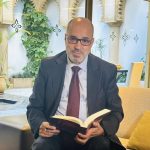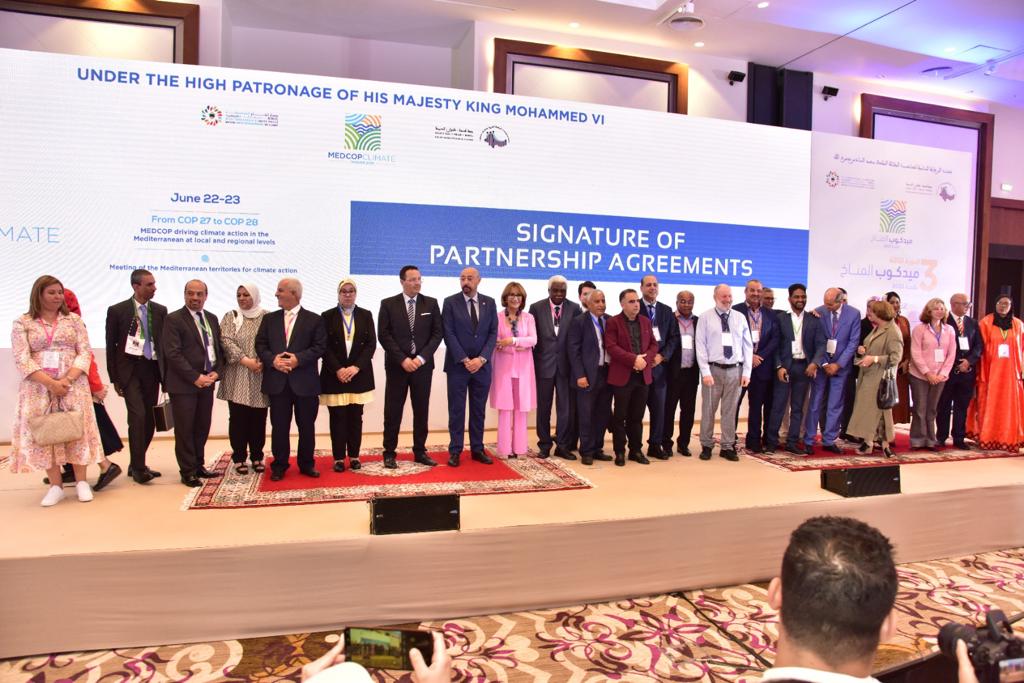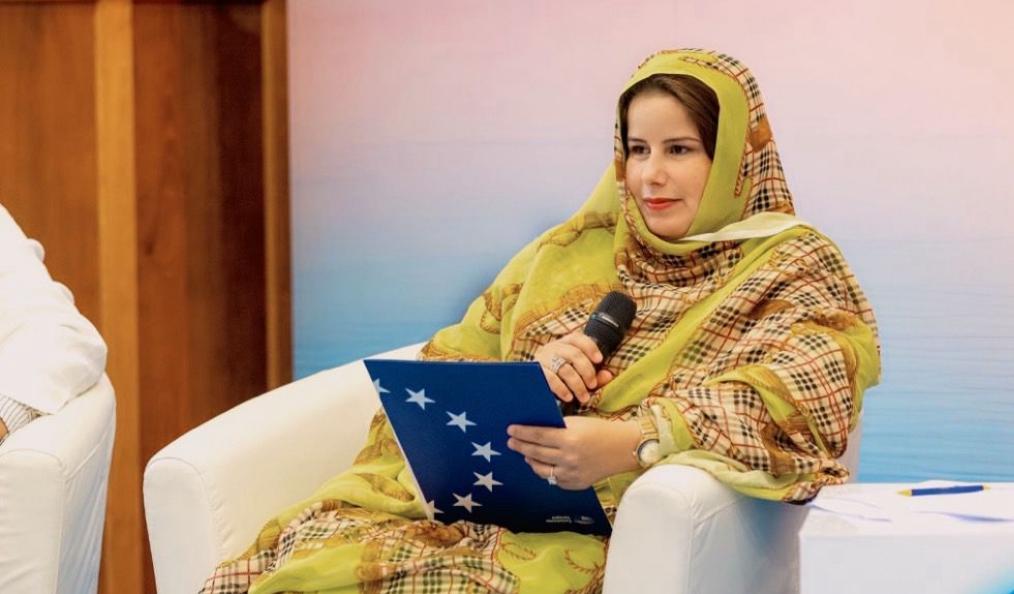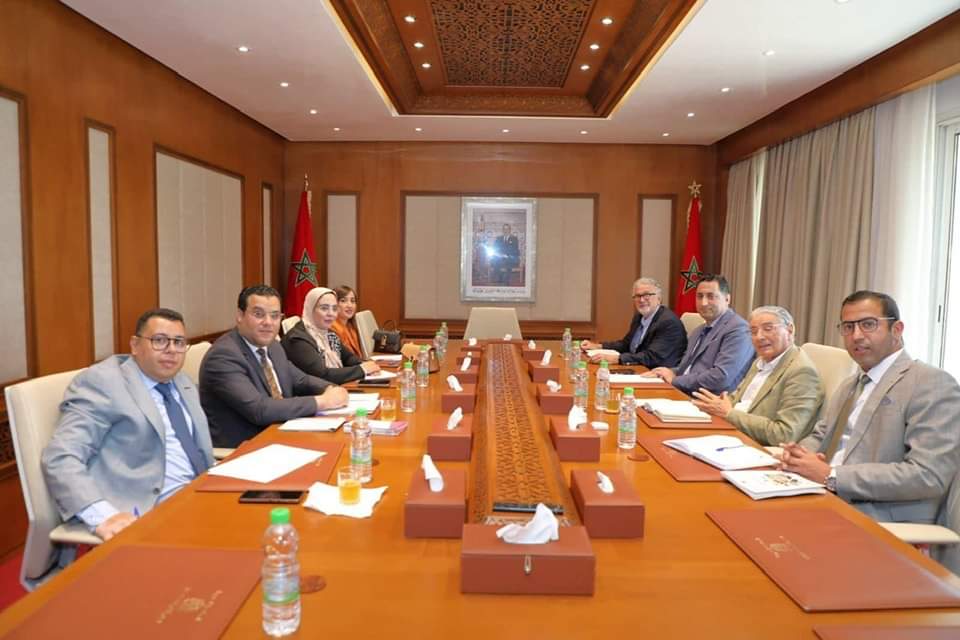Under the High Patronage of His Majesty King Mohammed VI, the 3rd edition of MedCop Climate, jointly organised by the Tangier-Tetouan-Al Hoceima Region and the “Mediterranean House of Climate” foundation, took place on June 22 nd and 23 rd, 2023, in Tangier, and concluded its proceedings.
Held this year under the theme « MedCop, the driving force of climate action at the local and regional levels in the Mediterranean, » this congress aimed to be a space for exchange, and debate, to realign the trajectory of Nationally Determined Contributions (NDCs) and accelerating the implementation of the Paris Agreement, based on the conclusions of the first Global Stocktake to be held during COP28 in Dubai from November 30 to December 12, 2023.
The congress brought together stakeholders from local governments, cities and regions, development partners, intergovernmental organisations, private sector, academics, civil society organisations, women, and youth led CSOs. The objective was to design and catalyse actions and solutions to foster the implementation of the Climate Agenda in the Mediterranean region. This Agenda will provide a platform to shape a common vision and amplify the voice of Mediterranean cities and territories within the climate related decision-making processes, such as Conference Of Parties (COPs).
A high-level opening ceremony organised in three parts.
The inaugural ceremony was organised in three parts. The national segment featured speeches by HE. Omar Moro, President of the MedCop Steering Committee and President of the Tangier-Tetouan-Al Hoceima Regional Council. HE. Nezha Bouchareb and HE. Mohamed Sefiani, Vice-presidents of the Mediterranean Climate House Foundation who welcomed the participants and recalled the context and the objectives of the conference. HE. Nizar Baraka, Minister of Equipment and Water, and HE. Leila Benali, Minister of Energy Transition and Sustainable Development, highlighted the leadership of the Kingdom of Morocco, under the enlightened guidance of His Majesty King Mohammed VI, in various advancements in sustainable water management and energy transition.
The second segment focused on regional and international participation, with interventions by the Union for the Mediterranean, UN-Habitat, the United Nations Capital Development Fund (UNCDF), UCLG World and UCLG Africa, the Mediterranean Climate House Foundation, and ICLEI. These actors emphasised the importance of local governments in implementing the Climate Agenda and the need to strengthen cooperation as a lever for accelerating innovation and sharing solutions, as well as showcasing ongoing initiatives and the necessity of enhancing synergies among them.
The third segment witnessed the signing of six (6) high-impact partnership agreements involving the Tangier-Tetouan-Al Hoceima Region, the Mediterranean House of Climate Foundation, UCLG Africa, AMCDD, UNCDF, AMEE in addition to seven cities in TTA region. These agreements focused on significant programs that illustrate Morocco’s commitment at regional, national, and local levels toward a low-carbon, inclusive, and resilient economy.
Aligned with the challenges faced by the international community, the MedCop Climate Tangier 2023 saw the participation of over 1,200 attendees representing 36 nationalities, including eminent climate experts and specialists.
Rich and intense debates
The debates of this MedCop revolved around key themes that aimed to bridge the gap in adaptation, mitigation, resilience, and finance. These themes included energy transition, water management and the blue economy, circular economy applied to urban waste management, urban resilience, access to finance and decentralised cooperation, nature-based solutions, climate and human mobility, inclusivity and the climate & gender agenda. Eight (8) thematic hubs and 15 sessions were led by 131 speakers.
In addition to the debates, several activities took place alongside MedCop, including eight (8) side events, including the Union for the Mediterranean (UfM) climate & energy business forum, and sixteen (16) parallel activities that contributed to the discussions.
Several meetings and exhibition spaces were animated throughout the territory of the city of Tangier by partners such as the Abdelmalek Essaadi University, the Municipality of Tangier, professional chambers, OFPPT, the National Education Academy, and civil society organisations. They organised conferences, exhibition spaces, awareness sessions, and other activities related to climate action.
In addition to the formal sessions, side events and B to B held within the MEDCOP venue, a “Medina of Solutions” with more than thirty exhibitors representing public and private actors, cooperatives, and civil society entities allowed participants, on the sidelines to discover several programs, projects, and initiatives carried out in Morocco and Mediterranean countries on climate, environment, and sustainable development.
The work of the MEDCOP Climate Tangier 2023 led to the adoption of a final declaration and recommendations emphasising the imperative of making this event a decisive milestone in the global agenda for the preparations of the COPs. Some of the main commitments and recommendations of the MedCop include:
o Strengthening multi-level and multi-actor governance:
✔ The presence of subnational actors to bridge the gap between national commitments and concrete actions on the ground was strongly emphasised. In this regard, a clear definition of roles and responsibilities among stakeholders would facilitate effective collaboration to accelerate the implementation of NDCs. An inclusive multi-level governance process involving different actors is necessary to establish a common vision and ensure local ownership. This action will facilitate the co-creation of innovative solutions to increase ambition and strengthen resilience.
o Incorporating territorial issues into the climate negotiation process:
✔ Supporting the role of cities and territories in the global agenda and including them as stakeholders in the process of accelerating and implementing NDCs and accessing climate finance.
o Accelerating the energy transition:
✔ Promoting, testing, implementing, and developing energy efficiency solutions for local communities using local energy savings as a new asset class in project financing.
✔ supporting the involvement of local authorities in projects for large-scale deployment of renewable energy, through innovative financing.
✔ emphasising the central importance of promoting green hydrogen in the decarbonization process of economies, green mobility, and energy independence. In this regard, there is a favourable climate for establishing an institutional, regulatory, technological, and financial framework and creating a coherent ecosystem among all actors involved in the clean hydrogen economy throughout its value chain.
o Blue Economy and Water-Energy-Food Nexus:
✔ Supporting a transformative blue economy in the Mediterranean and investing in the blue economy through the protection of marine protected areas, tourism, aquaculture, nature-based solutions and eco-services, waste management, water treatment, sustainable maritime transport, and onshore and offshore renewable energies. These efforts will contribute to combating climate change and creating jobs.
✔ Promoting innovative approaches to ensure that financial flows reach the blue economy, and that local governments and local entrepreneurs can prepare well-designed projects that attract investors.
✔ Supporting the local implementation of the Mediterranean Water Strategy led by the Union for the Mediterranean through the effective involvement of local authorities.
✔ Supporting research and development by having credible and reliable scientific information for informed decision-making in territorial water policies.
It has been suggested to institutionalise, within the Mediterranean Climate House, a Science/Policy Interface that will engage in dialogue on topics related to the climate emergency in territories.
✔ In this regard, Morocco, through its proactive strategy in water supply and demand management, could serve as a source of inspiration at the regional level to accelerate adaptation and resilience measures.
o Strengthening nature-based climate solutions:
✔ Enhancing the resilience of cities and territories to climate change includes promoting nature-based climate solutions, which can make significant progress towards multiple SDGs, including biodiversity conservation, as well as actions to accelerate adaptation and resilience.
✔ Advocating for adaptation options based on community values and norms that promote climate-resilient urban development under a rights-based approach, encouraging the participation of vulnerable local and regional communities.
o Women and climate: Moving from the status of women as victims of climate change to the status of women as actors in strengthening resilience:
✔ Development of adaptation and mitigation plans, programs, and projects at the national and subnational levels in Mediterranean countries, adopting a gender-sensitive, equitable, and fully transparent approach, taking into consideration vulnerable groups, communities, and ecosystems.
✔ Strengthening the representation of women in decision-making spheres and climate negotiation bodies.
✔ Promoting the full participation and leadership of women and girls to enhance the effectiveness of climate-related actions, particularly those related to natural resource management and disaster risks.
✔ Establishing operational mechanisms to support women in accessing climate finance while developing gender-sensitive financing at the Mediterranean scale.
✔ Supporting the institutionalisation of the MEDITERRANEAN NETWORK: WOMEN FACING CLIMATE CHALLENGES IN THE MEDITERRANEAN and establishing governance and management bodies for the network. It will be incubated within the Mediterranean Climate House.
o Strengthening and structuring the framework for decentralised multilateral cooperation in the Mediterranean Basin:
✔ Positioning Mediterranean countries as key actors in the concrete implementation of the Marrakech Partnership for global climate action.
✔ Supporting the active engagement of local and regional governments in the COP28 agenda and all climate agendas, either through their networks or national delegations.
✔ Supporting the creation of the MEDITERRANEAN NETWORK OF THINK TANKS WORKING ON CLIMATE CHANGE, based on constructive discussions during MedCop 2023 in Tangier. This network will collaborate with the Strategic Watch Observatory of the Tanger-Tétouan-Al Hoceima Regional Council.
✔ Enhancing coordination among Mediterranean climate-focused civil society organisations through strengthened collaboration between existing regional networks of climate CSOs. MEDCOP supports the initiative of civil society participants in MEDCOP 2023 to establish a MEDITERRANEAN CIVIL SOCIETY NETWORK FOR CLIMATE.
✔ Supporting the creation of an enabling environment for innovative financial solutions for municipalities, including direct access to climate finance, access to capital markets, the ability to benefit from guaranteed mechanisms, and engagement in Public-Private Partnerships (PPPs).
✔ Increasing the involvement of local authorities and non-state actors from Southern countries in international initiatives, particularly by ensuring better access to technologies and financing.
Considering the great success of the third edition of MEDCOP 2023, the following decisions have been made:
❖ Structuring and aligning MEDCOP Climate with the international climate agenda and making it a periodic regional reference event and a multi-level cooperation platform combining expertise, ambition, and innovation.
❖ Strengthening the role of the Mediterranean Climate House as an incubation institution for projects that catalyse climate action and reinforce the dynamics and initiatives led by territorial actors in mitigation, adaptation, and climate finance for increased resilience and climate justice in the Mediterranean Basin.
❖ Supporting the institutionalisation of the permanent secretariat of MEDCOP Climate, headquartered within the Mediterranean Climate House in Tangier, responsible for coordinating MedCop Climate events and mobilising major international networks of experts, local authorities, economic actors, academic institutions, and NGOs to assess the climate agenda within the Mediterranean Basin.











